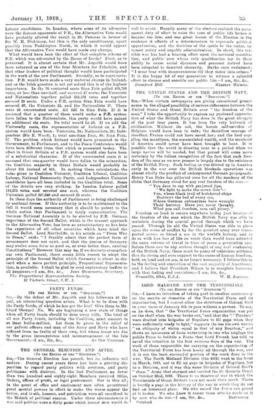THE UNITED STATES AND THE BRITISH NAVY. [To THE EDITOS
or THE "Se:crams.") Sin—When certain newspapers are giving seneational promi- nences to the alleged possibility of serious Meranoes between the United States and Great Britain over "the freedom of the seas," I take the opportunity to express my profound apprecia- tion of what the British Navy has done in the groat struggle of the paet four years. It has been the very bulwark of civilization. Without its old, the heroin seLf-siscrifice of Belgium would have been in vain; the dauntless courage of steadfast France could not have saved her; and the food sup- plies, the munitions, the accumulated wealth, and the manhood of America could never have been brought ho bear. It is possible that the world is drawing WES to a period when no large navies will he needed, but that period will come more certainly by the fullest recognition of the foot that enoh free- dom of the seas as we now possess is largely due to the exieteuce of the British Navy. Suoh feeling as was stirred up in America early in the war over the British blockade operations was almost wholly the product of underground German propaganda. Henry Van Dyko has pilloried once for all the mockery of the claim that Germany stood for any real freedom of the sees :— " You dare to say with perjured lips, 'We fight to make the ocean free '— You, whose blaok trail of butchered skips
Bestrews the bed of every sea, Where Gorman submarines; have wrought Their horrors. Have you never thought.
What you call freedom, men call piracy."
Freedom on laud is secure anywhere to-day just becouse of the freedom of Th0 seas which the British Navy was able to maintain during the crucial period through which we bays passed. Through its aid the United States was able to plum upon the scene of conflict by far the greatest army over trans- ported across so broad a sea in the world's history, and to do so with loss loss of life en route thou would have attended the same volmno of travel In time of peace a generation ago. Before there eau be any serious thought of any real weakening of the British Navy, there must be years of unbroken evidence that its strong and sure support to the cause of human freedom, both on land and on sea, is no longer necessary. I believe this to be the feeling and conviction of the vast majority of Americans, and I believe that President Wilson is in complete harmony with that feeling and conviction.—I am, Sir, AO.,


































 Previous page
Previous page